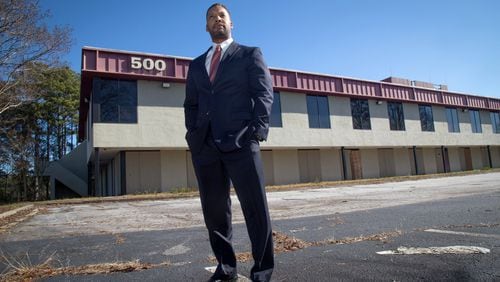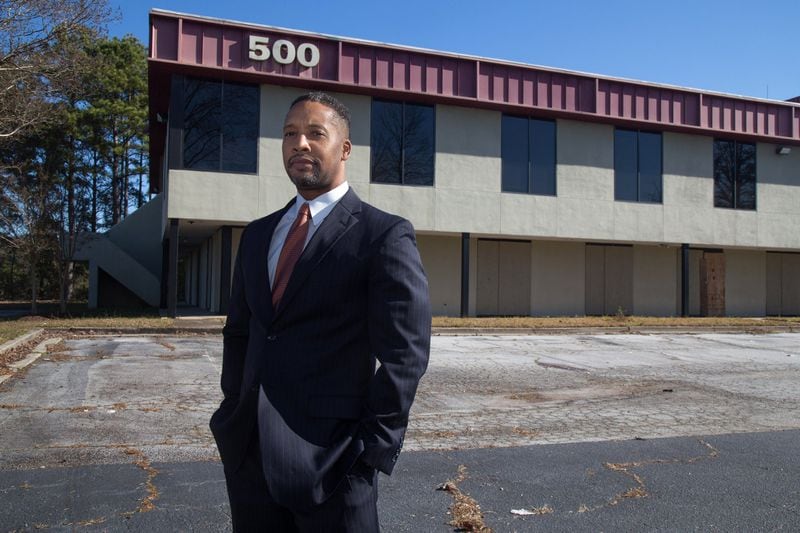Andrea McEachron gambled on herself and lost.
It was 2009 and she was teaching in a special reading program for DeKalb County Schools. They wanted her to go to the classroom and teach, which would have been a $25,000 pay cut.
She didn’t want to go back to the classroom, so amid what would be known as the Great Recession and while a cheating scandal was dominating the local news, McEachron quit.
“I am educated. I am experienced. I thought I would get another job easily,” McEachron said. “But it was the perfect storm.”
Unable to get a job, McEachron worked as an adjunct at Morehouse College. Instead of a $25,000 pay cut, she took a $40,000 pay cut.
She owned three rental properties and lived in a Grant Park townhouse that she built. Within two years of leaving her job, bankruptcies and foreclosures had taken all of them.
“I couldn’t focus. I was trying to focus on paying my bills and sustaining myself,” McEachron said. “I couldn’t maintain myself trying to get by.”
McEachron is just one of thousands with financial horror stories coming out of the 2007-2009 economic downturn. Many have clawed back losses - but not back to where they were a decade ago.
And African-Americans as a group have had a particularly difficult recovery.
While the current economy seems to be booming, the recession widened the already large wealth gap between white and black households, according to a recent study by the Pew Research Center.
The study showed that in 2016, the median wealth of non-Hispanic white households was $171,000, or 10 times the wealth of black households, which stood at $17,100. The wealth gap increased between middle-income black and white families but shrank between lower-income black and white families from 2007 to 2016.
The median wealth of middle-income blacks fell to $33,600 in 2013, down 47% from 2007. Middle-income white families experienced a 31% decline as their median wealth fell to $131,900. That gap hadn't narrowed by 2016, according to Pew.
Things fall apart
“It sets you back. You have to go and regroup and figure things out,” said Joshua Butler IV, who, like McEachron, is a black Atlantan. “When you start comparing my life then and now, it is not comparing apples to apples. I think in a lot of ways, I have recovered but not to the full degree financially, but there are some aspects of my life that are better. Simpler.”
A decade ago, Butler had his sights set on becoming a big-time developer. He got his hands on three office buildings off of Fulton Industrial Boulevard just yards from the Fulton County Airport and an exit to I-20.
He had already gutted the buildings in preparation for re-building it into 66,000 square feet of office space in the long-downtrodden area located 20 minutes south of downtown Atlanta.
Today, the property still sits barren and boarded up, while other areas along the boulevard have been cleared out for various forms of redevelopment. Standing in the vacant parking lot on Christmas Eve, Butler can only watch and wonder.
“It was perfect,” Butler said wistfully. “I lost a tremendous amount of money. I lost more money than most people earn. And that was it. Things just fell apart from there.”
It doesn’t take much prodding for Butler to reveal that with cash, deposits, equity and debt, he lost $250,000 on the deal.
“I went to (defunct bank) Washington Mutual and they said the money was not here,” Butler said. “I lost my line of credit. It didn’t matter that I had a good history. They didn’t have any money to lend. I was just a small businessman doing the right thing that was adversely affected by the recession.”
The experience changed Butler. He is writing now and does business consulting. In 2017, he successfully ran for the East Point City Council. And he is dipping his toe back into developing — slowly.
“I am looking at buying some apartments or commercial properties,” Butler said. “I’ll see what is out there.”
Credit: Steve Schaefer
Credit: Steve Schaefer
“Mom and dad couldn’t save us”
Tia McCoy has seen it from all sides. First working at a non-profit helping people buy homes. Then counseling them on ways to keep their homes. And now as a real estate agent selling homes.
“It is one thing to spend time helping people become homeowners and another thing to learn how to help people save their homes,” said McCoy, who served as the homeownership center director for Resources for Residents and Communities, a community development corporation, from 2007-2013. “There are a lot of emotions come with that. Because it affected everybody, not just people of certain income levels.”
McCoy still gets emotional recounting some of the stories of people who worked to build homes but had to eventually abandon them because of the economy, including, she said, a member of the Georgia legislature, whom she provided income to when her income shifted downward.
“I didn’t know how to leave those conversations at work, listening to stories of loss,” said McCoy, who left the organization in 2013 and now works for Habitat for Humanity while also selling real estate and consulting on the side. “It was very hard for me personally, but it was harder for the people. Buying a home is one of those big major stressors and here you are about to lose this thing and you have to move and find a place to move.”
Homes are the primary asset for most middle-class families, and in Georgia, the story of home ownership rates parallel Pew’s national data on wealth. Before the recession, homeownership among black families was becoming something of a norm, reaching 53 percent in 2007.
But after the recession, black home ownership in Georgia continued to decline for almost a decade. In 2016, it dropped below 45 percent for the first time since the 1970s before it began to rebound in 2017.
McCoy, 52, said because of the nature of her non-profit, most of her clients were African-American.
“Historically, we might not have the resources available,” said McCoy, who is also black. “Mom and dad couldn’t save us.”
“You feel like a failure”
McEachron, who is single, said it didn’t make much sense for her family to help her if they were going to pay her mortgage for a month. How would she pay it the following month?
On Dec. 11, 2012, McEachron was packing to move at the end of the year because she knew she was about to lose the house she built in 2005 because she had not been able to pay the mortgage in a year.
That’s when a deputy sheriff knocked on her door and told her she had to immediately vacate her three-story, three-bedroom townhouse.
“It was traumatic, and I felt bad at first. You feel like a failure,” McEachron said. “But the bankruptcy was freeing, because I was struggling to pay bills I could not pay. And they build houses every day. I knew I could get a new one.”
That same day, she moved into a two-bedroom apartment. She scored a deal on a storage unit for $1 the first month. But she couldn’t afford the fees the second month, so she ended up selling some belongings , donating others to charities and begging friends to allow her to store some in their garages.
McEachron got a new job with the Atlanta Public Schools – in a classroom. She was slowly able to save and repair her credit.
“I make a little bit more money than I did in DeKalb, but I haven’t made up what I lost,” McEachron said. “If I didn’t lose that job in DeKalb, I would have been fine.”
In February 2017, she closed on a new three-bedroom townhouse in East Atlanta and moved in the following month.
“Getting my own place again meant everything to me,” McEachron said. “It is a sense of pride and accomplishment. I didn’t give up and wallow in pity. I didn’t quit.”
Data Reporter John Perry contributed to this article.
About the Author








